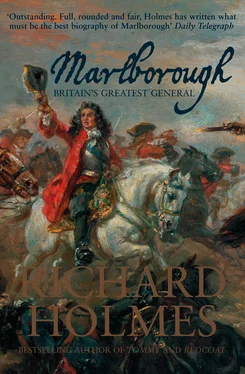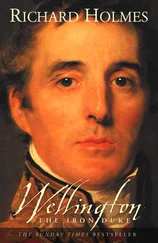1 ...7 8 9 11 12 13 ...42 Lord Wharton waspishly asked the new peers, when they took their seats, whether, like a jury, they voted by their foreman. Most had adopted grand territorial titles, apparently confusing the Italian-born Duchess of Shrewsbury. ‘Madam,’ she said to the pious Lady Oxford, ‘I and my Lord are so weary of talking politics. What are you and your Lord?’ Lady Oxford dourly replied that ‘she knew no Lord but the Lord Jehovah’. ‘O dear! Madam, who is that?’ enquired the duchess innocently. ‘I believe ’tis one of the new titles, for I never heard of him before.’ 63
We should not be surprised that the House of Lords grew steadily in size. In 1687 there were twenty-six lords spiritual (archbishops and bishops) and 154 lords temporal at Westminster. By 1714 this had risen to 171 lords temporal and sixteen representative Scots lords, elected by their peers. There was a substantial inflation at the upper end of the peerage, with the record number of forty-four dukedoms in 1726. Degrees in the peerage were a matter of very real concern. The Tory leader Henry St John, ennobled as Viscount Bolingbroke in 1712, regarded the appointment as a slap in the face, for he believed himself entitled to an earldom, like his ally Robert Harley. Earls usually had one or two subsidiary titles, the senior of which was borne as a courtesy title by their eldest son, and their daughters were styled ‘Lady’. Sidney Godolphin’s granddaughter, who became Duchess of Leeds, cheerfully signed a letter with all her family titles: ‘I am, dear sister, affectionately yours, M Leeds, Carmarthen, Danby, Latimer, Dumblin, Osborne.’ 64
The last words of Anne Hyde, James II’s first wife, were: ‘Duke, Duke, death is terrible, death is very terrible.’ An outraged duke, whose wife had tapped him gently with a fan, sharply observed that his first duchess had never taken such a shocking liberty, although ‘she was a Percy’. 65 Peers’ brothers assiduously made use of their siblings’ titles. In 1704 Captain John Campbell wrote to his brother to say that he had survived Blenheim:
My Lord the post is going this minute so I have no time to write to Willie Primrose’s brother [Viscount Primrose] but I beg that your Lordship will be so kind as to tell him that his brother is wounded and without money.
He moved on to become a major in Hepburn’s Regiment in the Dutch service, and survived both ‘a very critical time’ at Ramillies and ‘cruel work’ at the siege of Lille, but eventually complained that promotion was too slow: ‘There is no man of my quality in the island of Britain that hath served so long as captain and major (which is now fourteen years) as I have.’
John Campbell’s luck ran out at Malplaquet. His elder brother James, who commanded the Scots Greys with great distinction that day, wrote to tell their brother that:
Colonel Hepburn’s [Regiment] is all cut to pieces the colonel and lieutenant colonel is killed our brother John is shot through the arm I have seen him this day, his surgeons have very good hopes of him and he is very hearty …
Despite the rush of claims on his interest produced by heavy casualties amongst senior officers, Marlborough ensured that John received the colonelcy of Tullibardine’s Regiment, left vacant by Tullibardine’s death at Malplaquet, but he died of his wound. James saw him buried in the Capuchin cloister in Brussels: seventy grenadiers with blazing torches followed him to the grave. ‘It is such a great loss that we cannot enough regret,’ wrote James. ‘This is a prodigious loss to your lordship and me to lose such a brother and comrade I do assure you that he is regretted by every one that knew him.’ 66
William Cadogan, told that he was to be ennobled for his service against the Jacobites in 1715, at once wrote to Marlborough, his patron, to ‘beg leave to return my most humble thanks for your great goodness in being pleased to approve of the good success I have endeavoured to render here, and your Grace’s representing them so very favourably to his Majesty’. He hoped to style his barony after ‘Cadogan, near Wrexham on the borders of Wales’, and, reminding Marlborough that he had no son, hoped that the title would be allowed to pass sideways to his brother. ‘I humbly beg pardon for mentioning it,’ he concluded, ‘and entreat your Grace would consider it no more than if I had not.’ 67 He was next elevated to an earldom in 1716, after distinguished diplomatic service in Europe, as ‘Earl of Cadogan, in Denbighshire, Viscount of Caversham in Oxfordshire; and Baron Oakley, in Buckinghamshire’. 68 The barony did indeed pass on to his brother Charles, and the earldom, with the new viscountcy of Chelsea added, was later revived for his descendants.
Interest was at its most viscid at election time. The House of Commons had 513 Members before union with Scotland in 1707 added forty-five Scots Members, bringing the total to 558, ‘knights of the shire’ for rural areas and burgesses for the boroughs. Throughout our period the franchise was limited, in the forty English counties, to ‘forty shilling freeholders’, and in the boroughs to men meeting the appropriate local qualification. For instance, there were ‘corporation boroughs’, where the corporation – maybe as few as thirteen men or as many as fifty-four – could vote; ‘freeman boroughs’ where all freemen – like London’s 8,000 liverymen – could vote; and ‘burgage boroughs’ where the franchise was attached to particular parcels of land, leaving Old Sarum in Wiltshire with just ten voters in 1705. Perhaps one man in seven had the vote. There was no secret ballot; most constituencies returned two Members, and many would-be MPs stood for several constituencies at once to allow a greater chance of success. It was to take the Industrial Revolution and the burgeoning of manufacturing centres to render the whole system palpably absurd, with great cities unrepresented while some tiny boroughs, villages then and now, glibly returned their two Members.
There were many ‘pocket boroughs’, where the electors were so dependent on a major landowner as to be effectively in his pocket, and ‘rotten boroughs’ where electors cheerfully sold themselves to the highest bidder. Although the high-minded occasionally inveighed against the system, there was no real pressure for change, certainly not from the electors themselves, who stood to gain good dinners and full pockets by its survival. In 1716 the electors of Marlborough sent a flowery petition to Parliament, attacking the Septennial Act and unsuccessfully arguing that triennial Parliaments were ‘the greatest security to the preservation of liberty’.
The Earl of Ailesbury’s family was Scots by origin and owned land in Bedfordshire, but it had a substantial interest in the Wiltshire constituencies of Marlborough, Great Bedwyn and Ludgershall. With the earl in exile in the Low Countries his son, Lord Bruce, presided over the family’s borough-mongering. In November 1701 the economist Charles Davenant, who had already represented the pocket borough of Great Bedwyn, told Bruce that seeking election at Ampthill, also within the family’s sphere of influence but less securely in its pocket, would require personal effort and financial outlay: it was therefore too risky for him.
I received the packet from Ampthill, and the letters from there have quite made me lay aside the thought of standing there. Besides, the electors are generally such a corrupt pack of rogues that it is a chance an honest gentleman should represent them. I hope I have done my country so much service that some friend or other will bring me into this Parliament. 69
In April 1705 Bruce’s agent warned him that there was dirty work afoot at Great Bedwyn, where ‘three or four score of the voters have received £5 each and have engaged to serve Pollexfen whose agents gave £5 to the women under pretence of their spinning five pounds of wool at 20 shillings a pound’. The night before the election the Whig agents got sixteen of the electors blind drunk, and the candidates’ servants kept them under guard until they were frogmarched to the hustings to cast their ballots.
Читать дальше












